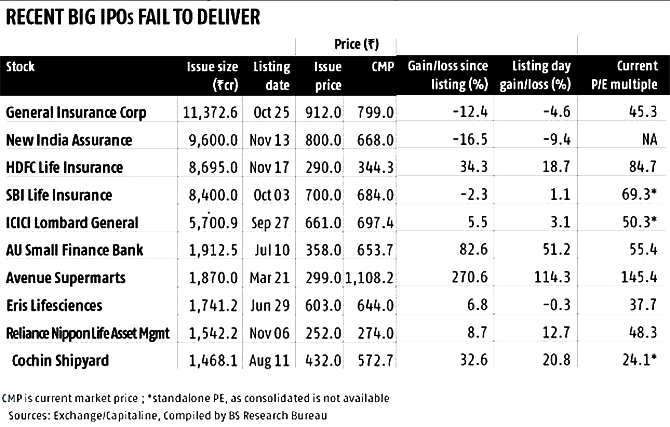Retail investors may burn their fingers investing in them, especially if the markets correct, experts tell Sanjay Kumar Singh.

Year 2017 has turned out to be a blockbuster year for the primary markets. So far this year, 33 companies have raised Rs 65,923 crore through their initial public offerings (IPOs), far exceeding the previous record of Rs 34,179 crore raised in 2007, according to data from Prime Database.
Many more IPOs are in the pipeline -- 12 companies have received Sebi approval to raise Rs 8,120 crore, while another 10 have filed their offer documents to raise Rs 18,011 crore.
However, as the IPO boom gets underway, there is a growing concern that promoters are pricing their issues expensively to take advantage of the torrent of liquidity gushing into the equity markets from both foreign and domestic investors.
Retail investors may burn their fingers investing in them, especially if the markets correct.
Ace investor Rakesh Jhunjhunwala voiced this fear recently when he said that there was a lot of froth in the IPO market and investors should stay away.
Quality not an issue
Towards the end of the IPO boom of 2007-10, many small, poor-quality companies had hit the markets at rich valuations. Many of them have vanished or are trading at a massive discount to their offer price.
"In this IPO cycle, we have not seen poor quality companies come to the markets because of the stringent eligibility norms imposed by Sebi (Securities and Exchange Board of India). There is also greater scrutiny of merchant bankers. Those that have come recently, especially from the financial services sector, are from large, well-established groups like HDFC, Reliance, etc," says Pranav Haldea, managing director, Prime Database.
Haldea points to two more positives.
"The average ticket size has been higher this time. We are not seeing Rs 100-200 crore IPOs, which indicates that more mature companies are coming into the markets," he says. Many of them also have private equity investors backing them.
"It indicates that these companies have undergone one or more rounds of funding, which means due diligence has been performed on them. One can be reasonably assured about their governance and accounting practices," he adds.
Stiff pricing is the issue

As the table shows, IPOs are trading at expensive valuations based on their trailing price-earnings (PE) multiples. Even at its currently elevated levels (compared to historical average), the Nifty is trading at a PE multiple of 26.2 times its 12 months earnings, the Nifty Financial Services Index at 30.12 times, and the Nifty FMCG at 41.92 times trailing earnings.
According to Ajay Bodke, chief executive officer and chief portfolio manager-PMS, Prabhudas Lilladher: "Valuations of IPOs across the board have been highly elevated for the last few quarters."
Adds Jimeet Modi, founder and CEO, Samco Securities: "There is no sanity in the IPO market from the valuation perspective. We are uncomfortable recommending any of the IPOs, unless there is one that leaves something on the table for investors."
The key risk, according to Bodke, is that if the markets were to correct, investors could end up losing money in many of these expensively priced offerings.
One has only to revisit the IPOs of infrastructure and power companies that came to the market in the 2007-10 period to understand the consequences of investing in expensive primary offers.
Besides a market correction, there is also the risk of business plans faltering and earnings not living up to expectations.
Jayant Manglik, president, retail distribution, Religare Securities, points out that most companies tap the primary market when the going is good for them financially. Hence, there is always the risk that the good performance track record you see now may not sustain.
Don't follow fund managers' lead
Mutual fund managers have been investing heavily in IPOs. If you feel tempted to follow them, avoid doing so.
Fund managers are facing massive inflows. Their mandate forbids them from holding cash above a certain percentage of their portfolio, hence they are compelled to invest.
Retail investors have no such problems.
"The institutional investor is also much above the retail investor on the information ladder. As soon as he perceives a headwind, he will exit in time while the retail investor could be left holding the can," says Bodke.
Stick to quality
One situation in which an IPO investment may be considered is if it belongs to a sector for which no option is available in the secondary market.
Insurance companies or stock exchanges are two such sectors. But then investors should stick to companies having strong franchises, high market share and attractive return ratios.
"If the market corrects, even these marquee names will correct. But investors will have some protection available. Because of the compounding nature of these businesses, they may be able to make up in due course for the error of overpaying," says Modi.
In probability terms, however, higher the price you pay, the more you tilt the balance of profitability away from you. Says Manglik: "While investments can be considered in IPOs of good companies despite their rich valuations, most such investments will always run relatively higher risk of losses in the short-term or sub-par returns over the medium term."
If you make such an investment, have an investment horizon of at least four-five years and avoid selling during a downturn.
Modi suggests that investors keen to enter a newly listed business should wait for 200 days. "That is the time it takes for the IPO effect to wear off and stock price to settle down to a more realistic level," says Modi.
The bigger risk lies in investing in poor quality businesses.
According to Modi, 20-30 per cent of the companies coming into the markets now may not even exist 10 years from now. The investors stands the risk of losing his capital by investing in such businesses.
Finally, avoid the impulse to speculate in IPOs by investing for listing gains.
Many recent IPOs such as Khadim India, New India Assurance and General Insurance Corporation failed to provide listing gains in what could be a sign of investor fatigue setting in.
Photograph: Olu Eletu/Unsplash.com












 © 2025
© 2025